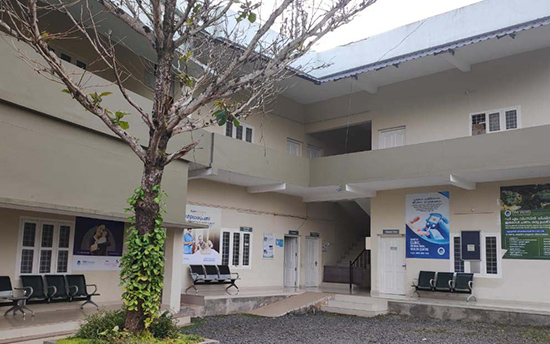Dr. Moopen’s Medical College, Community Medicine Department
Community Medicine provides Promotive, Preventive, Curative and Rehabilitative healthcare for an entire community with an emphasis on preventative measures at various levels. Community medicine takes an active role in maintaining the well-being of a particular community, considering their needs.
Department of Community Medicine in Dr. Moopen’s Medical College educates its students in learning and understanding factors influencing health among communities. The programme provides the students with hands-on experience in survey techniques and research. They are also actively involved in the implementation of National Health Programmes and health education activities. The programme aims to create doctors who can be community leaders and healthcare managers in urban and rural settings.

The Rural Health Training Centre (RHTC)
RHTC Chundale is a medical facility of Dr. Moopen’s Medical College, dedicated to the medical students and the public in learning promotive, preventive and curative services to the population of Wayanad. The facility is staffed with a full-time medical officer along with specific clinical services like gynaecology and paediatrics. The activities of the RHTC are monitored by an Assistant Professor from the Community Medicine department and it’s under the administrative control of Dean of Dr. Moopen’s Medical College.
facilities:
- Outpatient department
- Obstetrics
- Pharmacy
- Laboratory
- Male and Female Ward
- Minor Procedure Room
- Labour Room
- Medical Record room
- Demo/Class Rooms
- Accommodation
- Kitchen and Dining Area
An overview of health issues among the tribal and low-income communities
Wayanad district has the highest tribal population (1,36,062 members) in the entire state of Kerala. The tribes in the district usually remain isolated, a majority of them have poor health status and have their own customs dissimilar to the mainstream society.
The tribal population faces social problems like poverty, illiteracy, indebtedness, superstitions related to health, substance abuse and addiction (alcohol, tobacco, betel nut), deficiency diseases(goitre), infectious diseases like Tuberculosis, Malaria, Leprosy and genetic abnormalities like Sickle cell anaemia, G6PD deficiency, cultural problems, infertility and STD. Lack of personal hygiene and health education, illiteracy and inaccessibility to affordable health services are some of the main factors for their ill-health.
The Role of RHTC among the tribal and low-income communities
- Provides free consultation and discounted rates for medicines and lab services for the tribal population.
- Health Advocacy
- Observance of Public health days recommended by Government of India & WHO (eg: World Health Day, Village Health Nutrition Days, etc.)
- Training of students and interns (MBBS & Nursing) in community oriented primary healthcare and rural based health education for the rural community attached to it.
- It conducts field studies/Research aspects of Health and Family Welfare, RCH, Nutrition, Health education and Communicable and Non-Communicable diseases and also provides field services for research works in public health.
- Maternal Health Checkup
- Under 5 health checkup
- Family Planning, RTI/STDs
- Sanitation
- Hygiene and proper nutritional practices/cooking.
- Health Education on importance of nutrition
- Anthropometric measurements of infants and children
- Special emphasis on nutritional demonstration, diseases due to malnutrition and its precautions.
Why choose RHTC
The RHTC, due to its mission and location, is an ideal destination for students or trainees who are intending to carry out demographic, anthropologic or community studies among the tribal population. The students can make use of the facilities in the Community Medicine Department and the RHTC for mock presentations, discussions, brainstorming sessions, and classes on health education. The centre also will provide basic facilities for lab investigations.
The students will have the complete assistance of our expert faculty during their period of research. The service of a full-time statistician is available for the data analysis of the projects prepared by the students.
Moreover, Dr. Moopen’s Medical College has a registered Internal Ethical Committee and Internal Research Committee that can thoroughly scrutinise the ethics and study design of the project. The Community Medicine Department will evaluate the project and facilitate its presentation among scientific forums. They will also provide guidance for publishing the work in indexed journals.
